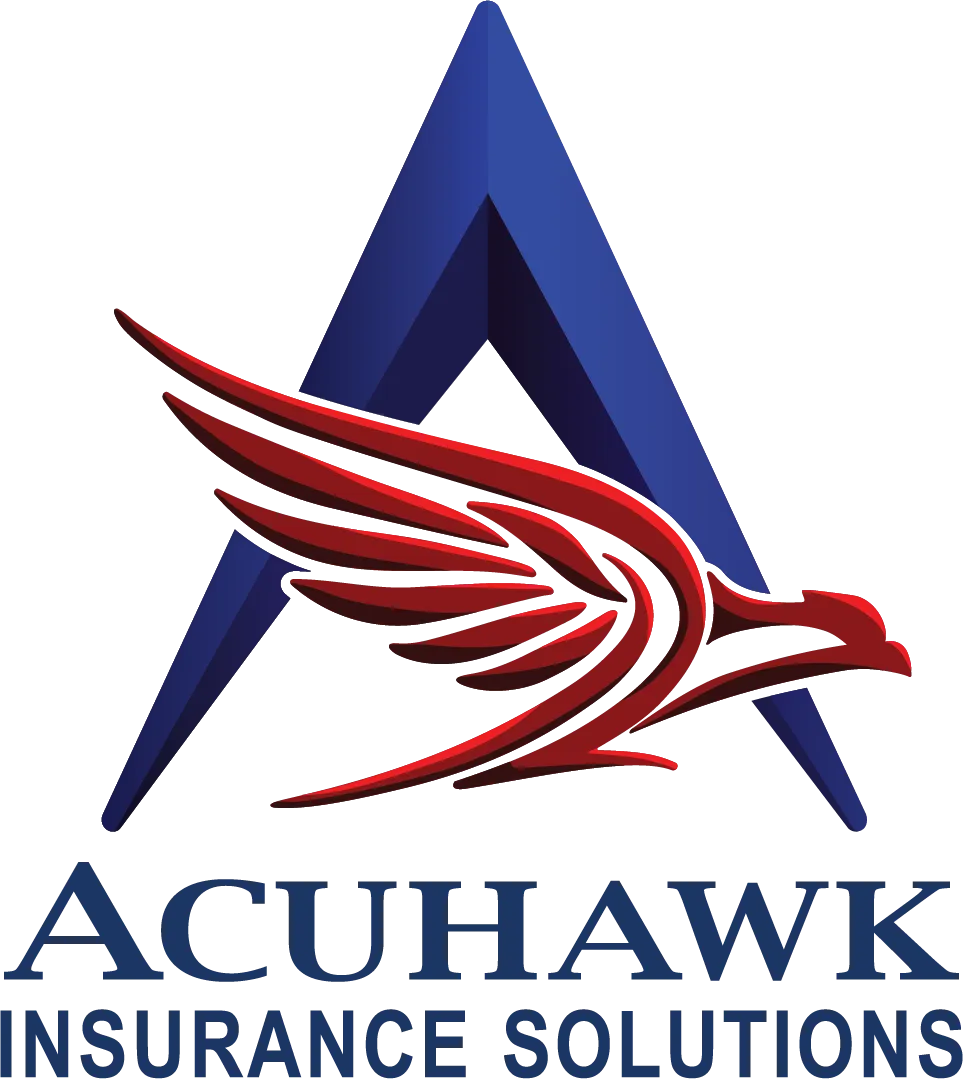531-222-2120
531-222-2120
Need Help? Our FAQs Can Guide You!
Frequently Asked Questions
(FAQs)
At Acuhawk Insurance Solutions, we know that insurance can be complicated and often raise more questions than answers when families and business owners start looking for coverage. Our mission is to simplify the process and explain it in a way that makes sense to you. We’ve compiled answers to some of the most common questions we receive from clients just like you, so you can feel confident and comfortable with the information needed to make informed decisions about your coverage.
Still have questions? Our friendly team of licensed insurance agents are always happy to help!
Select a category below to jump to the corresponding section
Working with us at Acuhawk
At Acuhawk Insurance Solutions, we prioritize building strong, lasting relationships with our clients. In this section, you'll find answers to questions about what it’s like to work with us, from our personalized approach to customer service to how we ensure your insurance needs are met every step of the way.
What types of insurance and financial products do you offer?
We offer a wide variety of insurance products including policies for individuals, families, and small businesses. Examples include: General Liability, Home/Renters, Auto, Health, Life, Disability, and Fixed Annuities. To see a more complete product line up, click here, or contact one of our licensed agents today here.
How do you help clients find the best coverage?
We first collect the necessary information to assess your needs and get quotes started. Next, we search our various carriers, doing the research and quotes for you before presenting the results. We flex to your communication style preferences whenever possible whether that be to communicate via email, phone, or in person. Our line can even send and receive text messages!
What makes Acuhawk different from other insurance agencies?
Independent: We are an independent brokerage, meaning we have access to 50+ different insurance companies for our various products. We do the shopping for you to get the best value for your unique situation.
Service: At Acuhawk, we also believe in providing exceptional customer service and work hard to educate and serve our clients while building lasting relationships.
Community: Our agency owners are heavily involved in the local small business community, volunteering their time and resources regularly to help others thrive. We do this primarily through our free networking group, Small Business Owners' Alliance that we founded in 2023.
How do I get started with Acuhawk?
Getting started is easy! Simply reach out to us here. Our friendly team will be delighted to schedule a consultation to discuss your insurance needs and guide you through the process of finding the right insurance solutions for you.
How do you handle claims and policy changes?
We aren't just here for the initial sale - we provide continued, year-round support for all of your servicing needs. From making policy changes to filing claims, we are here to help! Don't worry, you will still have the convenience of using self-service functions through the carrier websites, apps, or call centers. Having a local agent is just added support!
Do you offer ongoing support and policy reviews?
At Acuhawk, we are available for and encourage regular policy reviews, at least annually, to ensure you are properly covered as life changes. Since we have access to a variety of carriers, we can also help you re-shop your coverage, as a need arises. This allows you the peace of mind knowing you are getting competitive rates without having the headache of trying to find a new professional you can trust.
When and how are you available to meet with clients?
We’re typically available Monday through Friday from 8:30 AM to 5:00 PM, but we’re happy to accommodate appointments outside those hours upon request. While we primarily work virtually, we’re also available to meet in person—whether over coffee in a public setting or at your home if that’s more convenient for you.
Insurance Terminology
Understanding insurance terminology can feel overwhelming, but it doesn't have to be! In this section, we’ll break down some of the most common terms you’ll come across when exploring your insurance options, making it easier for you to make informed decisions about your coverage.
To see definitions of the different types of products we offer, please visit our product page here.
Insurance Carrier
The company that provides and underwrites an insurance policy.
Premium
The amount you pay for your insurance coverage, typically on a monthly, quarterly, or annual basis.
Insured
the person or entity covered by an insurance policy, entitled to benefits or compensation for covered losses. This can be the policyholder or a third party listed in the policy.
Policyholder
The person or entity that owns the insurance policy and is responsible for paying the premiums.
Deductible
The amount you pay out-of-pocket before your insurance kicks in to cover the remaining costs of a claim.
Coinsurance
The percentage of a covered claim that the insured is responsible for paying after meeting the deductible. For example, if your policy has an 80/20 coinsurance, the insurer pays 80%, and you pay the remaining 20% of the covered costs.
Coverage Limit
The maximum amount your insurance policy will pay for a claim, either per incident or over the course of the policy period. Sometimes there are sub-limits for certain categories or types of coverages.
Replacement Cost
The cost to replace damaged property with new items of similar kind and quality, without deducting for depreciation.
Actual Cash Value (ACV)
The value of property after depreciation is deducted, which may result in a lower payout compared to replacement cost.
Endorsement
A modification or addition to an insurance policy that changes its terms or coverage.
Exclusions
Specific situations, conditions, or damages that are not covered by your insurance policy.
Liability
Protection that covers damages or injuries you cause to others or their property, often part of auto, home, and renters insurance. Usually there are exclusions for intentional acts.
Claim
A formal request made to your insurance company for payment based on a covered loss.
Underwriting
The process by which an insurer evaluates the risk of insuring you and decides on your premium and coverage terms.
Beneficiary
The person or entity you designate to receive the benefits of your policy, such as in life insurance or health coverage.
Additional Insured
A person or entity added to an insurance policy, providing them with coverage under certain conditions.
Certificate of Insurance
A document that proves insurance coverage, showing policy details like coverage limits and effective dates.
Declarations Pages
The section of an insurance policy that summarizes the key details, including the policyholder's information, coverage types, limits, deductibles, premium amounts, and policy effective dates. It essentially acts as a snapshot of your policy, providing a quick reference to the essential details.
Commercial Insurance
At Acuhawk Insurance Solutions, we specialize in helping small business owners navigate the complexities of commercial insurance. Below, you’ll find answers to some of the most frequently asked questions related to protecting your business—whether you're looking to cover your property, liability, employees, or unique risks specific to your industry.
What types of commercial insurance do I need for my business?
The right coverage depends on your business type, size, and risks. Common policies include General Liability (protects against lawsuits), Commercial Property (covers buildings, equipment, and inventory), Workers’ Compensation (for employee injuries), and Commercial Auto (for business vehicles). Some industries may also need Professional Liability (E&O) or Cyber Insurance for additional protection.
Our licensed professionals at Acuhawk Insurance Solutions are experienced in helping business owners find the coverages they need and understand them.
Does my small business need insurance if I work from home?
Yes! A standard homeowners policy typically won’t cover business-related claims. If you run a business from home, you will likely need a standalone policy. The best policy will depend on the nature of your work, but we will work with you to determine options available.
What is a Business Owner’s Policy (BOP), and do I need one?
A BOP bundles General Liability and Commercial Property Insurance into one convenient and cost-effective policy. It’s ideal for small to mid-sized businesses, especially those with a physical location or valuable equipment. If you need both liability and property coverage, a BOP may save you money compared to buying separate policies, while also including additional add on protections.
How does commercial auto insurance differ from personal auto insurance?
Personal auto insurance does not cover vehicles used for business purposes, unless properly endorsed, if allowed by the carrier. Commercial auto insurance protects vehicles owned or used by your business, covering liability, physical damage, and even employees who drive for work. If you or your employees use a personal vehicle for business tasks, you may need Hired & Non-Owned Auto coverage as well.
How much does commercial insurance cost?
The cost of commercial insurance varies based on factors like your industry, business size, number of employees, location, and coverage limits. A solo consultant may pay far less than a construction company with multiple employees and vehicles. The best way to determine your cost is to get a customized quote based on your unique risks and coverage needs.
Health & Accident Insurance
At Acuhawk Insurance Solutions, we’re committed to helping individuals and families secure the right health and accident coverage. In this section, you'll find answers to common questions about health insurance options, accident coverage, and how to choose plans that provide the protection you need for yourself and your loved ones.
When can I enroll in a Marketplace based health insurance plan?
You can enroll in a health plan during the Open Enrollment Period, which typically runs from November 1st to January 15th in most states. If you miss this window, you may still qualify for coverage through a Special Enrollment Period (SEP) if you experience a qualifying life event, such as marriage, having a baby, losing other health coverage, or moving to a new area.
What life events may open up a Special Enrollment Period (SEP) event for enrollment?
You may qualify for an SEP if you experience a major life change, such as:
Losing employer-sponsored coverage
Getting married or divorced
Having a baby or adopting a child
Moving to a new ZIP code or state
Gaining citizenship or lawful residency
Experiencing certain income changes that affect subsidy eligibility
Most SEPs allow a limited period of time from the triggering event date to enroll in a new plan.
Can I get health insurance if I’m self-employed or don’t have employer coverage?
Yes! If you’re self-employed, a freelancer, or don’t have employer-sponsored coverage, you can buy a plan through the Health Insurance Marketplace or directly from an insurer. Depending on your income, you may qualify for subsidies to lower your monthly premium. Some people also choose short-term health plans or association health plans for temporary coverage, but these usually do not include the same essential benefits as ACA-compliant plans.
What’s the difference between an HMO, PPO, and EPO health plan?
HMO (Health Maintenance Organization) – Requires you to choose a primary care doctor (PCP) and get referrals for specialists. Typically lower cost but has a limited network.
PPO (Preferred Provider Organization) – Offers more flexibility, allowing you to see any doctor without a referral, but usually has higher premiums.
EPO (Exclusive Provider Organization) – Similar to an HMO but doesn’t require referrals. However, it only covers in-network providers except in emergencies.
Am I eligible for a health insurance subsidy or financial assistance?
Many people qualify for subsidies to lower their monthly premiums through the Affordable Care Act (ACA) Marketplace. Your eligibility depends on your household income and size.
If you earn between 100% and 400% of the Federal Poverty Level (FPL), you may qualify for a premium tax credit. Some lower-income individuals may also qualify for Medicaid or cost-sharing reductions to lower out-of-pocket costs if on a silver plan.
Laws and eligibility requirements may change. Contact a licensed insurance agent at Acuhawk Insurance Solutions to learn more.
Life & Disability Insurance
At Acuhawk Insurance Solutions, we understand the importance of planning for the unexpected. In this section, we answer some of the most common questions about life and disability insurance, helping you understand your options for protecting your loved ones and securing your income in the event of illness or injury.
What is life insurance and why do I need it?
Life insurance is a contract between an individual and an insurance company, where the individual pays premiums in exchange for a death benefit that will be paid out to their beneficiaries upon their passing. Life insurance is essential because it provides financial protection to your loved ones, ensuring they are taken care of financially in case of your unexpected death.
Whole Life
Whole life insurance offers permanent coverage with guaranteed premiums and a lifetime death benefit. It accumulates cash value that can be borrowed against or used to pay premiums, offering both protection and financial flexibility for estate planning or emergencies.
How do I determine the right amount of coverage for my life insurance policy?
The appropriate amount of coverage depends on factors such as your current financial situation, outstanding debts, future financial goals, and the needs of your beneficiaries. Consulting with a licensed insurance professional can help you assess your needs and find the right coverage amount.
Can I purchase life insurance for someone else, like a spouse or child?
Yes, you can purchase life insurance for someone else if you have an insurable interest and their consent.
What factors influence the cost of life insurance premiums?
Factors such as age, health status, lifestyle habits, coverage amount, type of policy, and length of coverage term can impact the cost of life insurance premiums.
How does the application process for life insurance work?
The application process involves working with a licensed agent to fill out a detailed questionnaire about your health, lifestyle, and other relevant information. In some cases, a medical exam may be required, but this would be paid for by the insurance company. The insurance company reviews the application, including medical information, before approving the policy.
What is disability insurance and why do I need it?
Disability insurance provides income replacement if you are unable to work due to an illness or injury. It helps ensure you can continue to meet financial obligations while you recover.
What’s the difference between short-term and long-term disability insurance?
Short-term disability insurance provides benefits for a few months after an illness or injury, while long-term disability insurance offers coverage for a longer period, potentially until retirement age, depending on the policy.
How do I qualify for disability insurance benefits?
To qualify for benefits, you typically need to meet the policy’s definition of disability, which may require that you are unable to perform your job duties for a certain period of time due to a covered illness or injury.
Personal Property & Casualty
At Acuhawk Insurance Solutions, we help you protect what matters most. This section answers common questions about personal property and casualty insurance, including coverage for your home, vehicles, and other personal assets. Whether it’s safeguarding your property from damage or ensuring you're covered in case of an accident, we’ve got you protected.
How can I get a copy of my declarations pages?
You can request a copy of your declarations page by contacting your insurance carrier directly. Most insurers allow you to access and download it through their online portal or mobile app in a documents section. If you're unable to find it online, call your insurer’s customer service, and they can send you a copy via email or mail.
What’s the best way to make sure I have enough coverage for my home, car, and personal belongings?
To make sure you’re properly covered, review your insurance policies regularly and consider adding extra coverage if necessary. If you’ve purchased new belongings or your home’s value has changed, you may need to adjust your home or renters insurance. Also, an umbrella policy can offer added protection for unexpected accidents.
What happens if I cause damage to someone’s property or hurt someone?
If you’re responsible for damaging someone’s property or causing an injury, your personal liability coverage through your home or auto insurance typically covers the costs. However, if the damages are significant, it could exceed your policy limits. This is where a personal liability umbrella policy can provide extra protection. Most policies also have exclusions if the damage was intentional.
Do I need additional coverage for high-value items like jewelry, guns, or electronics?
Standard home insurance may not fully cover high-value items like jewelry, firearms, or electronics. Many insurers offer the option to add a rider or endorsement to increase coverage limits for these items. Alternatively, you can get a Personal Articles Policy, which provides specialized coverage for specific items, often requiring an appraisal. These policies can even cover losses, which are typically excluded under standard homeowners insurance, like mysterious disappearance.
What is the difference between replacement cost and actual cash value for home insurance?
Replacement cost means your home insurance will pay to replace your belongings with new items, while actual cash value factors in depreciation, meaning you’ll get a payout based on the current value of your items. For example, a 5-year-old TV may not be worth as much as a brand-new one under actual cash value.
How much auto insurance coverage do I need?
The right amount of auto insurance depends on factors like your car's value, your assets, and your state’s requirements. At a minimum, you'll need liability coverage for injury or property damage to others. However, you may also want comprehensive or collision coverage to protect your own car, particularly if it's new or valuable. There are also several optional coverages that can be financially beneficial, even if not required by law, such as uninsured/underinsured motorist, medical payments, emergency roadside assistance, rental car reimbursement, and more.
What does home insurance actually cover?
Home insurance covers damage to your house and personal property in cases like fire, theft, vandalism, wind and hail. These are called "perils" or causes of loss. Home insurance policies also include liability protection for household members. Some policies may also cover temporary living expenses if you're displaced while your home is being repaired due to a covered loss.
Does home insurance cover things like floods or earthquakes?
Basic home insurance doesn’t cover flooding from outside water sourceor earthquakes. If you live in an area prone to these types of natural disasters, you can purchase separate flood insurance or earthquake coverage to make sure you're protected.
What does personal liability umbrella insurance cover?
A personal liability umbrella insurance policy gives you extra coverage beyond your regular home or auto insurance. If you're found responsible for an accident or injury that exceeds your standard coverage, an umbrella policy can help cover the extra costs, like medical bills or legal fees.
Do I need renters insurance if I don’t own my home?
Yes, renters insurance is still important. It covers your personal belongings, like electronics, clothes, and furniture, if they're stolen or damaged due to a covered "peril" (cause of loss). Plus, it includes personal liability protection in case someone is injured in your rented space, which could save you from big expenses down the line.
Who’s responsible if my neighbor’s tree falls and damages my home or belongings?
In most cases, your homeowners insurance would cover the damage to your property, as it’s your home that’s affected. However, if the tree fell due to your neighbor’s neglect or if they were responsible in some way, their liability coverage might help pay for the damage. It's always a good idea to discuss the situation with an insurance professional to better understand which company may be responsible.
What should I do if I am in an auto accident?
Stay calm and check for injuries.
Call 911 if needed.
Move to a safe location and turn on hazard lights.
Call the police to file a report, if required.
Exchange information with other drivers and witnesses.
Document the scene by taking photos of damages and injuries.
Notify the responsible insurance company as soon as possible. You can also call your local Acuhawk agent for support.
Avoid admitting fault—let the insurance companies and authorities handle the investigation.
What should I do if I think I may have storm damage?
Stay safe: Ensure you’re out of harm’s way before inspecting any damage.
Document the damage: Take clear photos or videos of any visible damage to your home, roof, or property.
Avoid making temporary repairs unless necessary (e.g., covering broken windows, tarping open holes in a roof). t’s better to wait for an insurance adjuster’s inspection.
Get a professional inspection: If you are unsure if there is damage, it can help to have a local licensed contractor assess the damage.
Contact your insurance company: Report the damage and file a claim, if the loss is significant enough that the cost of repairs or replacement will be over and above your deductible.
Keep receipts for temporary repairs or any expenses incurred while waiting for the claims process.
Unsure if the situation warrants filing a claim? Contact us at Acuhawk Insurance Solutions to discuss your policy's specific deductibles and coverage limits.
Financial Solutions
At Acuhawk Insurance Solutions, we’re committed to helping you secure your financial future. In this section, we answer common questions about our budgeting consultations and fixed annuities, providing guidance to help you manage your finances and plan for a stable retirement.
What is a fixed annuity, and how does it work?
A fixed annuity is a safe, long-term savings option that provides guaranteed growth and steady income in retirement. You make a lump sum payment (or series of payments), and in return, the insurance company guarantees a fixed interest rate on your money for a set period. When you’re ready, you can withdraw funds or convert it into lifetime income, depending on your needs.
Some contracts offer indexed-linked interest investment options and/or optional benefit riders with added advantages for death benefits, withdrawal guarantees, and more.
Are fixed annuities a good option for retirement savings?
Fixed annuities can be a great choice if you want secure, tax-deferred growth with no stock market risk. They’re especially useful for retirees looking for predictable income and protection from market volatility. However, they’re best suited for those who don’t need immediate access to their funds, as early withdrawals may come with surrender charges or tax penalties. Because of this, it is almost always best to use an annuity as just one strategy within a more diversified portfolio of savings and investments.
What budget counseling services does Acuhawk offer?
Our budget counseling packages can be tailored to your unique needs from a one-time in-depth review to a comprehensive package with on-going support, coaching, and follow ups.
Local Business Connections
At Acuhawk Insurance Solutions, we believe in supporting local businesses and fostering community growth. In this section, you’ll learn about resources designed to help small business owners thrive, including our Local Business Resource List and the Small Business Owners Alliance. We’re dedicated to connecting you with the tools, networks, and opportunities to succeed in your business journey.
What is the purpose of the Local Business Resource Guide list?
We are proud to support our local community in Omaha, Nebraska by providing this free resource of local metro businesses. We believe that local businesses are a fundamental and essential part of our economy and community. As a local business ourselves, we believe in supporting others fulfill their dreams as entrepreneurs and want to encourage others to do the same, when possible.
Is there any cost to having a business listed on the Local Business Resource List?
No. The Local Business Resource List is sponsored and provided free of charge by The Legacy Guardians Insurance and Financial Solutions. Please consider sharing the tool and support our neighbor businesses.
What is the Small Business Owners Alliance (SBOA)
The Small Business Owners Alliance (SBOA) is a local networking group of business owners and professionals founded by Nicole Redinbaugh, the owner of Acuhawk Insurance Solutions. It is a free community with both online and in-person opportunities to build relationships with the local small business community.
Is Acuhawk Insurance Solutions affiliated with this group of businesses on the Local Business Resource List?
Neither Acuhawk Insurance Solutions, or its parent company Redinbaugh Enterprises, LLC, is affiliated with the companies listed on the Local Business Resource List, nor do we warranty their work. We strongly advise you to conduct your own research before choosing to conduct business with any company, whether on our list or not. Please proceed at your own risk.
ACCURATE. HONEST. DEPENDABLE.
Our team at Acuhawk Insurance Solutions believes in providing education and transparency to our clients. We want you to feel comfortable and confident in the coverage you have so you can enjoy true peace of mind.
Schedule a complimentary consultation online with a licensed insurance agent at a time that fits your schedule. There is no cost for our professional services, so don't delay!
Don't see a time that works? Please contact us directly to review alternative options or start your quote online here.

Acuhawk Insurance Solutions Site Directory
About Us
Meet the Team
Small Business Insurance
General Liability Insurance
Business Owners Policies (BOPs)
Workers Compensation
Commercial Auto Insurance
Professional Liability (E&O)
Rental Property Insurance
Personal Insurance
Homeowners Insurance
Renters Insurance Condo Insurance
Auto Insurance
Motorcycle Insurance
Recreational Vehicle Insurance
Personal Liability Umbrella
Health Insurance
Individual Health Insurance
ACA/Marketplace Health
Medicare Advantage Plans
Medicare Supplement Plans
Prescription Drug Insurance
Prescription Drug Savings Cards
Dental Insurance
Vision Insurance
Small Group Health Insurance
Hospital Indemnity Plans
Life Insurance
Term Life Insurance
Whole Life Insurance
Indexed Universal Life Insurance
Final Expense Insurance
Disability Insurance
Short Term Disability
Long Term Disability
Financial Solutions
Annuity Investments
Budget Planning
Get in Touch
Client Forms
Resources
Blog
Local Business Directory
Licensed in Nebraska and Iowa
Copyright Acuhawk Insurance Solutions, a division of Redinbaugh Enterprises, LLC, 2025
ACCURATE. HONEST. DEPENDABLE.
Our team at Acuhawk Insurance Solutions believes in providing education and transparency to our clients. We want you to feel comfortable and confident in the coverage you have so you can enjoy true peace of mind.
Schedule a complimentary consultation online with a licensed insurance agent at a time that fits your schedule. There is no cost for our professional services, so don't delay!
Don't see a time that works? Please contact us directly to review alternative options or start your quote online here.

Acuhawk Insurance Solutions Site Directory
About Us
Meet the Team
Small Business Insurance
General Liability Insurance
Business Owners Policies (BOPs)
Workers' Compensation
Commercial Auto Insurance
Professional Liability (E&O)
Rental Property Insurance
Cyber Liability Insurance
Personal Property & Casualty Insurance
Homeowners Insurance
Renters Insurance
Condo Insurance
Auto Insurance
Motorcycle Insurance
Recreational Vehicle Insurance
Personal Liability Umbrella
Health Insurance
Prescription Drug Savings Cards
Dental Insurance
Vision Insurance
Small Group Health Insurance
Hospital Indemnity Plans
Life Insurance
Term Life Insurance
Whole Life Insurance
Indexed Universal Life Insurance
Final Expense Insurance
Financial Solutions
Short Term Disability
Long Term Disability
Annuity Investments
Budget Planning
Get in Touch
Client Log In
Client Forms
Resources
Blog
Local Business Directory
Small Business Owners Alliance Network
Licensed in Nebraska and Iowa
Copyright Acuhawk Insurance Solutions, a division of Redinbaugh Enterprises, LLC, 2025










